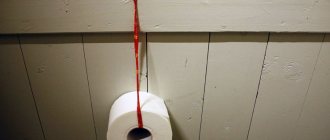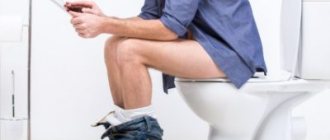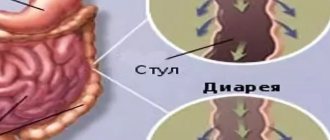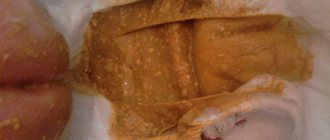Causes of sheep feces
- Insufficient consumption of foods containing plant fiber. The hectic pace of life forces us to eat dry food, eat fatty, fried foods, and sandwiches.
- Sedentary lifestyle or physical inactivity (sedentary work, leisure time, sitting at the computer or watching TV, driving a car even short distances).
- Insufficient fluid intake (dry food, replacing water with tea or coffee).
- Intestinal dysbiosis. Occurs after taking antibiotics to treat another disease.
- Psychological reasons. Some people, due to their natural shyness, are not able to relieve themselves in unfamiliar places (at a party, in a hospital, on trains). Because of this, spastic constipation occurs when feces are not able to overcome the spasmodic section of the intestine. This condition is resolved by the appearance of “sheep stool.” During a short stay in conditions that are uncomfortable for relieving oneself (going on a visit, staying at the workplace), a person, through an effort of will, restrains the urge and endures until returning home. This leads to constipation, compaction of stool and the appearance of “sheep” type feces.
The solution to sheep poop is to eliminate the causes of the condition.
- Dietary regime. It is advisable to include daily consumption of soups, cereals, and fermented milk products in your diet. Do not neglect breakfast because this leads to sudden overeating in the evening, which leads to overload of the stomach and intestines.
- Drinking clean water is a necessary condition for restoring normal bowel function. It is recommended to drink at least 1.5 liters of clean water per day.
- Sufficient consumption of plant fiber (vegetables and fruits) because fiber is a “janitor” for the intestines, it stimulates peristalsis and removes processed substances.
- Move, walk, spend time playing sports.
- If the cause of “sheep stool” is intestinal dysbiosis, then such a disorder is treated by taking biological products (Bak Set, Linex, Maxilac, etc.)
- To eliminate spastic constipation, antispasmodic drugs (Trimedat) are recommended.
In the vast majority of cases, sheep stool is associated with dysfunction of the colon. Problems with peristalsis (the ability to move intestinal contents) appear due to any gastrointestinal diseases. Experts say the main reasons are dysbacteriosis and the appearance of staphylococcus.
In addition, we should not forget about peptic ulcers, irritation of the walls of the small intestine and colitis. Also, the causes of sheep feces may be poor circulation in the intestinal walls and the syndrome of insufficiency of motor and reflex functions of the gastrointestinal tract.
According to experts, the main reason for the development of the condition is a decrease in the evacuation capacity of the colon. Such changes quite often occur if a person is faced with various pathological conditions of the endocrine glands or, for example, disorders in the functioning of the nervous system.
In addition, sheep feces may well occur when:
- the person is experiencing serious stressful situations;
- not drinking enough fluid;
- medications that contain active enzymes are used;
- surgical interventions are performed;
- leads a sedentary lifestyle.
Thus, there may be quite a few possible factors for the occurrence of the presented symptom. That is why it is very important to pay attention to its symptoms, as well as how diagnosis and treatment are carried out. Only in this case will it be possible to avoid the development of complications and critical consequences.
Sheep feces in most cases are accompanied by quite pronounced symptoms. The first sign of the disease should be considered to be irregular visits to the toilet.
In addition, over time - quite quickly - painful sensations form in one of the intestinal sections. In the case when pain and problematic urges are felt already during direct defecation, this can well be considered a fact of intestinal damage. It is very important to attend to adequate diagnosis as early as possible so that the causes and treatment of sheep stool in adults are no longer a problem.
If the disease is not treated on time, then simultaneously with the excretion of sheep feces, a person may well develop symptoms such as headaches and dizziness or, for example, a general deterioration in health. In addition, sheep feces may be directly associated with increased levels of nervousness and irritability. We should also not forget that there is a change in the number of age spots and wrinkles, formation is noted, but also from the whole body.
Other symptoms in children or adults are bloating, as well as an increase in blood pressure when trying to defecate (the most pronounced symptom is in older people).
In order to know what exactly sheep feces indicate in humans, it is very important to take care of correct diagnosis.
Sheep feces are considered a very delicate problem, but still, you should not postpone an appointment with a specialist if the following symptoms occur:
- Stomach pain;
- Frequent occurrence of constipation;
- Weakness;
- Bloating;
- Increased flatulence;
- Pain during bowel movements.
When bowel dysfunction occurs, it is often accompanied by additional symptoms:
- dizziness and headache;
- deterioration in general health;
- the appearance of wrinkles and age spots;
- unpleasant body and breath odor;
- flatulence and bloating;
- high blood pressure (more common in old age)
Feces in the form of sheep pellets deserve special attention, and the causes of this condition should be noted separately in an adult and a child (this will be discussed later). The list of provoking factors is quite extensive and includes both serious pathologies and more general conditions, for example, excessive consumption of fast food, a sudden change of environment.
Speaking about more serious causes of pea feces, experts pay attention to:
- diverticulitis;
- lengthening of the sigmoid colon;
- insufficient production of mucus by the intestinal walls;
- irritable bowel syndrome;
- inflammatory processes in the area of the large or small intestine;
- peptic ulcer of the stomach, duodenum;
- dysbiosis.
Factors such as insufficient blood supply to the intestines, long-term use of certain medications, and operations on the digestive system can also influence the appearance of this pathology. Considering all the causes of sheep stool, treatment in adults is recommended to begin as early as possible to avoid complications.
When talking about the treatment of sheep feces, they traditionally mean the so-called complex therapy. It is aimed not only at combating the leading pathological condition, but also at eliminating all existing problems with stool.
To eliminate the problem of sheep feces, drugs based on lactulose are most often prescribed, namely as laxative components. The presented list contains such names as Normaza, Lactusan and some others. In no case should you forget about some antispasmodic drugs, in particular Duspatalin or Mebeverine.
Also, the recovery course may well contain antitoxic components (Fervital, Zubicor and others). An equally significant part of the therapy are components that are designed to stabilize the state of the intestinal microflora (Linex, Bifiform). Of course, all of them should be used only after consulting a specialist.
Treatment will be adequately effective only if you adhere to a specific diet rich in a component such as fiber. It should also be compiled only by the attending physician. In this case, the patient is strongly recommended to lead an active lifestyle as much as possible, drink at least two liters of water daily, and also try to avoid stressful situations and overexertion.
If, after a complete course of using certain medications, no improvements in intestinal activity are identified, then to determine the causes of this disease, you will need to undergo a full gastroscopic examination. Of course, it should include fibrogastroscopy and colonoscopy.
As noted earlier, treating a problem such as sheep feces on your own is simply unacceptable. Such an approach can only aggravate the condition and lead to certain negative consequences. This is also true if sheep feces are found in a child.
Treatment of sheep feces should include the following methods:
- Physical activity. This will activate the intestinal system and quickly remove sheep feces from the body. It is recommended to start the morning with exercise or jogging; during the day you need to do massage, gymnastics, dance or swim. The main thing is to move more so that all muscle groups work.
- If constipation occurs due to a stressful situation, it is recommended to drink safe sedatives.
- It is necessary to revise the daily menu to include foods with a laxative effect. We cook only from fresh ingredients in a healthy way to restore a stable digestive process.
- Hard stools can be thinned by increasing daily fluid intake. Healthy fresh juices, compotes and decoctions of dried fruits.
- An enema will help quickly remove solid waste from the body, but only after permission from a doctor. To prepare the solution, you can use plain water or a decoction of medicinal herbs.
- dysbacteriosis;
- intestinal infections;
- tuberculosis of various forms;
- dysfunction of the thyroid gland;
- malabsorption syndrome;
- poor nutrition;
- kidney disease;
- insufficient digestibility of food;
- constant stress;
- allergic reactions;
- avitaminosis;
- diseases of the digestive organs in severe form;
- oncological diseases of the rectum.
- Changing the rhythm of life. With increased physical activity, the problem of constipation may resolve itself. Morning exercises are required, and regular swimming, running, and yoga quickly normalize intestinal function.
- Abdominal massage. The procedure is performed once a day, preferably in the morning on an empty stomach. Circular movements begin from the navel (sweat clockwise) with a gradual increase in diameter.
- Sedatives. Taken in case of constipation due to stress or nervous strain. A good option would be to take warm baths with herbs that have a relaxing effect and pine needles.
- Normalization of diet. Eating up to 6 times a day in small quantities will help food digest faster and be better absorbed. It is advisable to include vegetables, grains, bran, fresh fermented milk products in the daily menu (kefir is taken on the first or second day of its production, since, starting from the third day, it can act as a binder on feces), fish, wholemeal bread, but exclude fatty food, sweets, strong coffee and tea, white rice, white bread and baked goods.
- Drink sufficient fluids - at least 2 liters of clean still water per day, not counting first courses.
- Performing enemas with warm clean water or a weak decoction of chamomile, possibly with the addition of castor or vaseline oil. Enemas are used if constipation is not frequent.
- Taking castor, sunflower, sea buckthorn or almond oil. Depending on age, 1–3 spoons are prescribed 3–4 times a day for a week. After a week break and repeat the course again.
Lumpy feces during pregnancy, after childbirth and during breastfeeding
On the Bristol Poop Shape Scale, round poop is type 1. They arise as a result of infrequent bowel movements. Due to their long stay in the intestines, their color becomes dark, almost black, and their consistency becomes denser. When a person tries to poop, the intestinal walls begin to contract convulsively, which leads to the separation of feces into balls.
The most common cause of round feces is dysbacteriosis. But there are other equally common culprits for the appearance of feces in the form of balls, these include disruption of the colon and insufficient peristalsis.
The appearance of poop balls is also affected by your lifestyle. Poor nutrition, a sedentary lifestyle, and personal stress leave their mark on the functioning of the gastrointestinal tract. The intestines react very sharply to external influences and the emotional state of its owner.
If you are dehydrated or you consume too little liquid in food, or often eat dry food, then pellet stool occurs due to insufficient liquid. Normal feces contain about 80% liquid. With less content, the shit begins to disintegrate into lumps and has an abrasive structure.
While eliminating the infection, antibacterial drugs also have a negative effect on the body, as they sharply reduce the amount of beneficial microflora in the intestines. In place of normal bacteria, pathogenic ones develop, which causes the development of dysbiosis, fungal and bacterial infections, which in turn provoke local inflammation and irritation of the intestinal walls.
To solve the problem, it is necessary to do a special analysis - culture, which will show which microflora is in excess and which is deficient. To restore balance, the patient is prescribed probiotics and prebiotics.
During the period of bearing a child, a woman’s body undergoes significant changes, in particular, the physical and mental state and hormonal levels change. Pregnant women often suffer from constipation, and they also experience loose stools. This pathology occurs when the intestines are displaced under pressure from an enlarged uterus and significant stretching of ligaments and muscles, which reduces intestinal contractility and peristalsis.
Usually the situation normalizes in the first 3 to 4 days, but if the problem does not resolve itself, then simple treatment will be required - enemas and suppositories, but strictly as directed by the doctor.
Goat-like feces also occur in a nursing woman when her intestinal microflora is disturbed (constipation is caused by hormonal changes and stress) or during her recovery period after childbirth. Elimination of the problem must be immediate, as toxins can pass into breast milk.
Such dense feces can be caused by a number of factors that may be associated with pathologies of the nervous system or diseases of the gastrointestinal tract. They can also be a physiological property of the body.
The reasons may be:
- poor nutrition;
- colitis of various origins;
- sedentary lifestyle;
- hormonal disorders;
- irritable bowel syndrome;
- treatment with certain medications;
- insufficient use of plant foods;
- ulcers of the stomach, intestines;
- intestinal dysbiosis;
- pregnancy;
- dehydration of the body;
- bad habits;
- stressful conditions.
The causes of sheep feces in children are slightly different. The main ones are dysbiosis, stress, fear, and the use of medications with the presence of active digestive enzymes.
The cause of human sheep feces is usually dysfunction of the colon. Problems with peristalsis, as a rule, arise against the background of some diseases of the gastrointestinal tract. It could be:
- Dysbacteriosis;
- Staphylococcus;
- Peptic ulcer;
- Irritation of the walls of the colon;
- Colitis;
- Poor circulation in the intestinal walls;
- Syndrome of insufficiency of motor and reflex function of the gastrointestinal tract.
In general, the cause of sheep feces is a decrease in the evacuation capacity of the colon. This often happens when a person suffers from diseases of the endocrine glands or disorders of the nervous system.
Sometimes the causes of human sheep feces are stress, insufficient fluid intake, taking medications that contain active digestive enzymes, intestinal surgery, and a sedentary lifestyle.
If such constipation recurs frequently and lasts for quite a long time, it is necessary to take all necessary measures to treat it. Otherwise, there may be serious complications, including intestinal rupture and peritonitis.
How is sheep feces formed?
The intestines are a fairly mobile organ that can oscillate from side to side, like a pendulum. At this time, the contents of the intestines are mixed and the chyme moves towards the anus. This intestinal activity is called peristalsis and is regulated by the hormonal and nervous systems.
When these mechanisms work well, the stool is of normal consistency; disturbances lead to the colon moving in the opposite direction, sending the contents towards the stomach. Such a “swing” increases the time that chyme remains in the colon, causing liquid to be absorbed into the walls, and the density of feces increases. To ensure painless and quick exit of feces, they are crushed into small elements.
Carrying out diagnostics
As you can see, there can be many reasons for blackheads in stool. Of course, it does not happen that stool has the same color for a long time, because we eat food of different colors and consistencies. However, if blackheads are present for quite a long period, then this is a serious reason to think about your health. To understand the reason for this phenomenon, you need to urgently go to the hospital. Experts will be able to give you the correct diagnosis only after conducting diagnostics, which will include scraping, coprogram, and also determining the presence of worm larvae in the feces. If worm eggs were found, the patient will also have to take a blood test to determine their type.
Why does my baby poop goat poop?
In childhood, such an anomaly can occur due to dehydration, against the background of rapid loss of water, for example, with a very active lifestyle. Abnormal functioning of the sphincter can also provoke a change in the shape of feces.
The reason why a child poops goat poop may well be infection of the intestines with staphylococcus, an increase in temperature when faced with a cold. Experts call another factor the permanent retention of feces inside due to embarrassment or unsanitary conditions in the restroom at school or kindergarten.
A change in the shape of stool is usually accompanied by specific symptoms. First of all, this is straining for more than 25% of the total time of defecation, as well as the frequent need to remove bowel contents using the hands. Feces like goat peas in an adult are also accompanied by:
- after visiting the toilet there is no feeling of a complete bowel movement;
- the frequency of bowel movements decreases, amounting to less than three times within one week;
- During the process of emptying, a small amount of feces is released, namely less than 35 grams per day.
In order to accurately determine why an adult or child poops peas, a step-by-step diagnosis will be required.
At any age, the least traumatic testing methods are scatology and culture for the presence of dysbacteriosis.
Fibroesophagogastroduodenoscopy is also recommended, which will confirm the diagnosis and prescribe appropriate treatment. After a rehabilitation course for a problem such as round, dry and hard feces, it is recommended to conduct a re-examination. This will determine the effectiveness of therapy and the recovery process.
Such drugs act gently, do not harm the body and are not addictive.
- Water with honey. Every morning, dissolve a teaspoon of honey in a glass of warm water and drink it on an empty stomach an hour before breakfast. You can enhance the effect by eating several prunes.
- Juices. Between meals, it is recommended to drink freshly squeezed juices from plums, pumpkins, citrus fruits, apricots, you can add figs and kiwi.
- Rowan tincture. Cover a glass of washed berries (can be crushed) with sugar and set aside for several hours. After the juice has formed, 25 drops of vodka or alcohol are added to it. The product is taken one teaspoon once a day.
- Tincture on burdock leaves. Cut fresh raw materials, pour boiling water and leave to infuse. After three hours, the liquid is filtered and drunk a tablespoon before bed.
If a person regularly produces sheep feces, this technique will make it easier to pass it - you should place a small stool near the toilet so that your bent legs are raised during defecation.
Regardless of the cause of constipation, the following drugs are prescribed for their treatment:
- Mukolfak - apply one packet before lunch, if necessary, you can repeat the dose and before the evening meal, in extreme cases, the dosage can be increased up to 4 times a day. No side effects were identified.
- Duspatalin Retard - prescribed in the mornings and evenings, 200 mg 20 minutes before meals. Capsules should be swallowed whole with plenty of water.
- “Rectative” suppositories (contain horse chestnut extract) – bowel movements occur a short time after the administration of the suppository.
- Enterofuril is an antiseptic, available in the form of a suspension and capsules, which normalizes intestinal function. Contraindicated in case of fructose intolerance and in children of any age.
- Duphalac is a mild and safe medicine, and the dosage can be adjusted by the patient independently, but it is necessary to read the instructions.
With various pathologies, there are several types of feces in children, which you need to know about in order to prevent various diseases and unpleasant consequences in time.
- "Hungry" feces The color is black, dark green, dark brown, the smell is unpleasant. Occurs with improper feeding or fasting.
- Acholic feces Whitish-gray color, discolored, clayey. With epidemic hepatitis, biliary atresia.
- Putrefactive. Pasty, dirty gray, with an unpleasant odor. Occurs during protein feeding.
- Soapy. Silvery, shiny, soft, with mucus. When feeding with undiluted cow's milk.
- Fatty feces With a sour odor, whitish, a little mucus. When consuming excess fat.
- Constipation. Gray color, hard consistency, putrid odor.
- Watery yellow stool. When breastfeeding due to a lack of nutrients in mother's milk.
- Pasty, thin stool, yellow in color. It is formed due to excessive feeding of cereals (for example, semolina).
- Feces for dyspepsia. With mucus, coagulated, yellow-green in color. Occurs when there is an eating disorder.
Many mothers are interested in what baby’s stool should be like. It is worth paying special attention to this factor, since gastrointestinal diseases are especially severe at an early age. At the first suspicion, you should contact your pediatrician immediately.
In the first days after birth, meconium (dark color) comes out of the body. During the first three days, light-colored feces begin to mix in. On the 4-5th day, feces completely replace meconium. During breastfeeding, golden-yellow feces are a sign of the presence of bilirubin, paste-like, homogeneous, and acidic. At the 4th month, bilirubin is gradually replaced by stercobilin.
- Alcohol syrup of rowan berries, which is able to cope with the very cause of the symptoms. The product is consumed one teaspoon at a time. and diluted with water in advance. Therapy is carried out for 7-10 days until the complete cessation of abnormal bowel movements.
- Lingonberries are characterized by a laxative effect; they also activate peristalsis in the intestinal area. They can be consumed daily, fresh. At the initial stage, it is recommended to use no more than one or two berries at a time, later the quantity can be increased. In this case, sheep feces and its treatment with folk remedies must be discussed with a specialist.
- One tsp. olive or sunflower oil in the morning on an empty stomach, which will also be an excellent prevention of constipation and the formation of hardened stool.
The classic treatment of sheep feces in an adult or child should deserve no less attention. Laxatives are used that increase the volume of stool, for example, Mucofalk. If they turn out to be ineffective, other laxative options are used, namely osmotic ones - Duphalac, Forlax.
Also, after consultation with a specialist, it is permissible to use stimulant laxatives (Bisacodyl, for example). As the name suggests, they stimulate receptors in the colon, but should not be overused as they may become addictive.
They also pay attention to the fact that:
- Therapy will be incomplete without diet and pain relief with antispasmodics. Among the latter are such names as Drotaverine, Mebeverine and others - they are completely safe in this case.
- Depressive states, as well as autonomic disorders, are neutralized by the use of antidepressants and antipsychotics.
- Antimicrobial names are used to eliminate excess abnormal flora in the intestinal area. They are often combined with probiotics (for example, Bifikol or Linex) to ensure that the intestinal area is further populated with beneficial microorganisms after the use of antibiotics.
In the fight against lamb poop, you will need to stop drinking alcoholic beverages and various harmful foods. This applies to seasonings and sauces, because they irritate the intestines, causing a general worsening of the condition. It is recommended to eat in small portions, with at least three meals per day.
Spicy and salty foods, fatty and fried foods in any quantity are also prohibited. It is necessary to remember that:
- Fresh fruits and vegetables are extremely healthy;
- Every day it is recommended to eat dishes that contain whole grains; Porridge is no less useful;
- These products include a significant amount of fiber, which allows you to cleanse the stomach and intestinal walls.
Due to this, accumulated toxins and waste will begin to be eliminated much faster, while the intestinal muscles will contract optimally. All this stimulates the digestive process, as well as digestion, and serves as an ideal prevention of the problem presented.
Children are more prone to constipation than adults, which is due to the structure of their intestinal tract, as well as their low body weight, which causes rapid dehydration.
If a baby poops in small, hard pieces, then you should not hesitate to visit a doctor, as this may be one of the signs of meningitis or diabetes mellitus or other serious diseases. A problem is observed with excessively elongated sigmoid colon and intestinal ring, sphincteric functional disorders.
A child can poop peas at a high temperature, mental trauma and nervous overstrain. In this case, the baby needs to drink plenty of fluids, and usually within 24 hours the consistency of the stool returns to normal.
In advanced cases, surgery will be required to remove fecal debris.
In general, treatment of constipation, if stool comes out in small pieces, occurs quickly (normalizes after 2 to 4 days) and the prognosis is quite favorable. As a preventive measure and to prevent the problem from becoming chronic, it is necessary to leave more fruits and vegetables on the menu. If you are prone to goat feces, it is recommended to visit a gastroenterologist at least 2 times a year.
Bristol scale
English doctors at the Royal Hospital in Bristol have developed a simple but unique scale that characterizes all the main types of feces. Its creation was the result of the fact that experts were faced with the problem that people are reluctant to open up about this topic; embarrassment prevents them from talking in detail about their stool.
Based on the developed drawings, it became very easy to independently characterize your own bowel movements without any embarrassment or awkwardness. Currently, the Bristol Stool Shape Scale is used throughout the world to assess the functioning of the digestive system. For many, printing a table (types of feces) on the wall in your own toilet is nothing more than a way to monitor your health.
1st type. Sheep feces
It is called so because it is shaped like hard balls and resembles sheep feces. If for animals this is a normal result of intestinal function, then for humans such stool is an alarm signal. Sheep pellets are a sign of constipation and dysbacteriosis. Hard feces can cause hemorrhoids, damage to the anus, and even lead to intoxication of the body.
2nd type. Thick sausage
What does the appearance of stool indicate? This is also a sign of constipation. Only in this case are bacteria and fibers present in the mass. It takes several days to form such a sausage. Its thickness exceeds the width of the anus, so emptying is difficult and can lead to cracks and tears, hemorrhoids. It is not recommended to self-prescribe laxatives, as sudden release of feces can be very painful.
3rd type. Sausage with cracks
Very often people consider such stools to be normal, because they pass easily. But make no mistake. Hard sausage is also a sign of constipation. When defecating, you have to strain, which means there is a possibility of anal fissures. In this case, irritable bowel syndrome may be present.
4th type. Ideal chair
The diameter of the sausage or snake is 1-2 cm, the feces are smooth, soft, and easily amenable to pressure. Regular bowel movements once a day.
5th type. Soft balls
This type is even better than the previous one. A few soft pieces form and come out gently. Usually occurs with a large meal. Stool several times a day.
6th type. Unshaped chair
The feces come out in pieces, but unformed, with torn edges. It comes out easily without hurting the anus. This is not diarrhea yet, but it is already a condition close to it. The causes of this type of stool can be laxative medications, increased blood pressure, excessive consumption of spices, and mineral water.
7th type. Loose stools
Watery stools that do not include any particles. Diarrhea requiring identification of causes and treatment. This is an abnormal condition of the body that needs treatment. There can be many reasons: fungi, infections, allergies, poisoning, liver and stomach diseases, poor diet, helminths and even stress. In this case, you should not postpone your visit to the doctor.
Therapy for hormonal and neurological changes
Factors causing sheep feces can be endocrine and neurological disorders, such as:
- changes in protein metabolism;
- lack of thyroid hormones;
- Parkinson's pathology;
- diabetes;
- porphyrin disease;
- increased presence of calcium in the blood and decreased in the bones;
- multiple sclerosis.
Dry feces in the form of pellets can occur due to psychogenic factors (anorexia, depression, etc.). The main symptoms of constipation are pain during bowel movements and inconsistent visits to the toilet.
Bowel problems are more common in women than men due to weak abdominal muscles
Such people should take preventative measures for constipation - drink more fluids, coarse fiber foods, and lead an active lifestyle.
Sheep feces are eliminated using:
- Sunflower oil, drink 1 tsp in the morning on an empty stomach. funds for 3 days.
- Coniferous and paraffin compresses are used to relieve intestinal spasms. They help excrement move more easily into the rectum.
- Antispasmodic drugs are used with the permission of a doctor when thermal measures are contraindicated.
The abdominal muscles in the female half of the population are usually weaker formed than in men, and have an atonic character (feces do not come out in peas, but in a large structure) in nature, while in men they are spastic. Constipation occurs in women who are pregnant, sedentary or have significant body weight.
Treatment by a gastroenterologist
When sheep feces are observed constantly, you should find out the reason for this manifestation by seeking help from a gastroenterologist.
The doctor will perform some intestinal examinations to establish or exclude pathologies (colitis, diverticulosis, etc.) that have become the causes of atonic constipation.
When these diseases are identified, complex therapy is used, aimed at eliminating constipation itself, as well as the pathology that provoked it.
To do this, you will need to change your diet, eliminating foods that irritate the intestinal walls. Be sure to drink at least 2 liters of water per day (soups and drinks do not count).
To eliminate dense stool, you will need the following medications:
- Duspatalin – increases peristalsis.
- Lactusan is a laxative.
- Linex, Bifiform - restores intestinal microflora.
| A drug | Photo | Price |
| Duspatalin | specify | |
| Lactusan | specify | |
| Linex | from 273 rub. | |
| Bifiform | from 467 rub. |
When feces are formed systematically, then the menu should be changed. Before going to bed, it is good to eat fruits, dried fruits (prunes, raisins) are effective remedies against constipation.
Figs help to activate the intestines (before lunch, 2 berries will be enough).
Sheep feces will be eliminated if you reduce the number of flour products and take plant foods instead.
Fresh kefir also has a laxative effect, but stale kefir has the opposite effect.
Traditional methods
Dry feces in the form of peas can be treated using traditional methods. Prunes and gooseberries are considered excellent laxatives.
One of the folk methods for constipation is rowan tincture.
Rowan tincture will help get rid of constipation. Take rowan berries and sugar in the same 1:1 ratio and cover tightly with a lid. A month later, the rowan is taken out and 50 grams are poured into 1 liter of syrup. alcohol Use once a day, diluted a little in water.
If sheep feces are not treated, then cracks in the anus and hemorrhoids may form. Constipation can lead to malignant neoplasms of the colon.
Physical exercise helps to prevent spasmodic constipation. Exercise, a healthy lifestyle and abdominal massage have a beneficial effect on peristalsis.
Forecast
In general, treatment of constipation, if stool comes out in small pieces, occurs quickly (normalizes after 2 to 4 days) and the prognosis is quite favorable. As a preventive measure and to prevent the problem from becoming chronic, it is necessary to leave more fruits and vegetables on the menu. If you are prone to goat feces, it is recommended to visit a gastroenterologist at least 2 times a year.
Sheep feces is a defecation in which the feces look like dense lumps, similar to sheep feces. This pathology is a sign of spastic constipation, the manifestation of which is often associated with interruptions in the regulation of the ganglionic nervous system.
In a healthy person, the frequency of bowel movements should be at least once every two days. When this does not happen, the feces in the rectum begin to gradually thicken. When it is released, convulsive contractions occur in the intestinal tract, which break down the escaping masses into dry lumps.
Sheep feces in a child occurs due to dysfunction of the large intestine associated with disturbances in its peristalsis. Such a pathological process can be caused by the following reasons:
- dysbacteriosis – a decrease in the number of obligate bacteria (bifidobacteria, lactobacilli and bacteroides) inhabiting the intestinal environment. Accompanied by flatulence, abdominal pain, stool disorders and metabolic disorders;
- spastic or atonic colitis - inflammatory phenomena in the intestines;
- syndrome of insufficiency of motor and reflex function of the gastrointestinal tract;
- functional diarrhea.
In some cases, a decrease in the evacuation capacity of the colon in a child is possible due to functional disorders of the ANS, the influence of stress and the use of certain medications. In infants, this phenomenon is often associated with improper organization of the diet, early transfer to artificial formula and an irrational diet.
In addition to lump-like feces and irregular bowel movements, a characteristic symptom of intestinal damage is pain during bowel movements. If you have characteristic symptoms, you should make an appointment with a pediatrician or pediatric gastroenterologist.
Since this bowel disorder can be caused by a number of reasons, the list of diagnostic measures will vary in each specific case.
Thus, if intestinal pathologies are suspected, micro- and macroscopy of stool, bacteriological culture of stool and coprogram are used. Among the instrumental methods, contrast irrigoscopy and colonoscopy are used, which make it possible to study the anatomical and functional features of the colon, as well as the condition of its mucous membrane.
The complex of laboratory and instrumental examinations to identify dysbacteriosis includes microbiological analysis of stool, sigmoidoscopy, gastroscopy and ultrasound of the abdominal organs.
The final type of diagnostic research program is determined by the gastroenterologist based on the patient’s medical history and his initial examination.
Treatment regimens for sheep feces in an infant depend on the underlying cause. Taking into account the etiology of constipation, the doctor draws up a treatment program aimed at eliminating the underlying disease and eliminating problems with stool.
As drug therapy, the use of laxatives such as lactulose, laxatives and antitoxic drugs, as well as drugs to normalize the intestinal microflora is indicated. Great importance is given to following a diet rich in fiber, which should include fermented milk products, stone fruits (plums, apricots) and cereals. Products that have a strengthening effect - chocolate, rice, cookies, etc. should be excluded from the daily diet.
If you complain of irregular bowel movements accompanied by pain, you should seek medical advice. Self-medication in this situation can only worsen the child’s condition and lead to complications.
For prevention purposes, it is enough to follow the following recommendations:
- eat right, and the daily diet must include products of plant origin;
- to live an active lifestyle;
- drink at least 2 liters of fluid per day;
- avoid stress and other psycho-emotional overloads.
Sheep feces are a sign of spasmodic constipation, in which feces come out in the form of fragmentary dense lumps and look like sheep feces. The reasons for this manifestation are very diverse, from a basic change in diet to dangerous pathology of the digestive tract. May occur in children and adults. Bowel movements occur irregularly and are associated with pain.
In a normal state, the excrement of a healthy person is oblong in shape, moderately hard, not dry, and therefore passes freely at the time of defecation.
However, there are other types of feces.
Sheep feces is one of the forms of feces on the Bristol scale.
With constipation, stool can look like goat poop, sometimes intertwined into small dense pieces. When a person's stool is similar to lamb's or sheep's peas, this indicates a disease. Sheep feces come out of the colon with difficulty and cause a lot of discomfort to a person.
If stool dehydration does not change its shape to the desired one, and continues to come out in lumps, then you should contact a specialist to identify the cause.
Pea-shaped stool is very tight and hard when leaving the intestines and can lead to cracks in the anus. In this regard, this problem should be eliminated before it causes harm to health.











